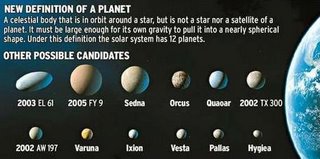
Astronomers - and scientists in general - are a lot more amusing to me now that I'm on the outside of the scientific community. I used to think that a lot of the issues faced by scientists were quite serious. I would engage the debate with fervor, arguing my side passionately, though ultimately without much point (as my opinion didn't actually matter, since I was an undergraduate). Then I got fed up with the whole thing - science - and moved on to something that seemed far more interesting and, in my eyes, had more potential: religion.
Looking back, I now realize that every field has its internal squabbles, religion probably most of all, and what I did was jump from the rapidly boiling pot into the fire. However, it's easier to notice in religion because, unlike science, religion has so many points of view to choose from. Turns out science is usually only "true" or "false," which is why so many more people like it.
Anyway, back to my amusement. Turns out that there's a big argument on about planets. What is a planet? How do you define "planet"? What makes a planet different from, say, an asteroid? Or from perhaps a "pluton"?
And they say that postmodernism hasn't affected science.
I think the whole thing is hilarious. When my cousin and I were quite small (small enough that we had no idea what we were saying, and that's the story I'll stick with), we had this argument in front of our mothers, who were sitting at the dining room table just after a thanksgiving meal. It seems we disagreed upon whose mother was larger. "My mommy's bigger," I stated. "No, MY mommy's bigger," he replied. As the argument escalated, our mothers turning brighter red, we began to shout back and forth at each other. Finally, in a fit of rage, Tim yelled, "well MY mommy's HUGE!"
God alone knows what we were on about, but I think we can liken some of these squabbles to the same sort of thing. I know that we need working definitions, but come on, two solid days of debate on what a PLANET is? Some scientists seem worried that Pluto will get kicked out of the planet-club if the debate is allowed to continue. Others are worried that if we come up with a solid definition, that hundreds of planets will now exist, making it too hard for small school children to remember what our solar system is like. Others think it's humiliating for the rest of the planets (like Jupiter and Saturn) if tiny chunks of rock (like Charon and Ceres) are allowed to be planets too. Size, after all, does matter.
In the end, I'm sure whatever they come up with will be earth-shattering (then again, they're astronomers, and after "Armageddon", I sure hope not), important, culturally relevant, and of course, enlightening. We'll all be better people when we know what a planet REALLY is to a bunch of white-haired guys who spend all their time indoors.
Looking back, I now realize that every field has its internal squabbles, religion probably most of all, and what I did was jump from the rapidly boiling pot into the fire. However, it's easier to notice in religion because, unlike science, religion has so many points of view to choose from. Turns out science is usually only "true" or "false," which is why so many more people like it.
Anyway, back to my amusement. Turns out that there's a big argument on about planets. What is a planet? How do you define "planet"? What makes a planet different from, say, an asteroid? Or from perhaps a "pluton"?
And they say that postmodernism hasn't affected science.
I think the whole thing is hilarious. When my cousin and I were quite small (small enough that we had no idea what we were saying, and that's the story I'll stick with), we had this argument in front of our mothers, who were sitting at the dining room table just after a thanksgiving meal. It seems we disagreed upon whose mother was larger. "My mommy's bigger," I stated. "No, MY mommy's bigger," he replied. As the argument escalated, our mothers turning brighter red, we began to shout back and forth at each other. Finally, in a fit of rage, Tim yelled, "well MY mommy's HUGE!"
God alone knows what we were on about, but I think we can liken some of these squabbles to the same sort of thing. I know that we need working definitions, but come on, two solid days of debate on what a PLANET is? Some scientists seem worried that Pluto will get kicked out of the planet-club if the debate is allowed to continue. Others are worried that if we come up with a solid definition, that hundreds of planets will now exist, making it too hard for small school children to remember what our solar system is like. Others think it's humiliating for the rest of the planets (like Jupiter and Saturn) if tiny chunks of rock (like Charon and Ceres) are allowed to be planets too. Size, after all, does matter.
In the end, I'm sure whatever they come up with will be earth-shattering (then again, they're astronomers, and after "Armageddon", I sure hope not), important, culturally relevant, and of course, enlightening. We'll all be better people when we know what a planet REALLY is to a bunch of white-haired guys who spend all their time indoors.

4 comments:
Interesting...I would have thought they would have had a definition for planets already??? How then did they decide on the ones we have? Funny though... the arguement does have the ring of a religious debate...
I know I'm not going to be losing sleep over it!
Do people ever tell you that you look like Tom Cruise?
Eddo, I'd have to say that you're the first. Thanks, I think ...
Post a Comment